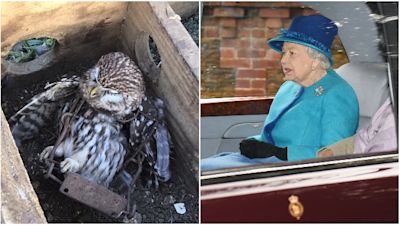Queen's Sandringham estate accused of setting traps dangerous to wildlife

The Queen’s estate at Sandringham has been accused of setting traps which put wildlife at risk.
A Little Owl was recently killed inside one of the traps on the Norfolk estate, which are set to protect the wild game birds and their eggs from predators such as rats and grey squirrels.
The National Anti-Snaring Campaign says the incident, earlier this year, was reported to the RSPCA and Norfolk Police as the owls are protected by law.
The dead bird was discovered inside the trap in May at Flitcham which is a short distance from both Sandringham House, where the Queen stays, and Anmer Hall, the Cambridges’ country residence where they spent the lockdown in the Spring.
It’s also just a few metres from a bird hide where the Queen is sometime seen sitting inside bird watching.
The man who photographed the Little Owl inside the Fenn trap, who does not wish to be named, told me it is “just about the worst snare you can set”.
In April, new government legislation came into force which demands that the Fenn traps are only permitted ”for the purpose of killing grey squirrels, weasels, rats, mice, other small ground vermin”.
But staff from the NASC recently found ten of the same Fenn traps still in use at Sandringham and they have called on the royal estate to replace the traps with those which safeguard wild bird and animals, such as the stoat.
They filmed some of the traps they discovered at Sandringham on 8 December 2020.
Simon Wild, the co-founder of the anti-snaring body says the traps “shouldn’t be set at ground level” where protected species are at risk of being killed.
The campaigner have urged Sandringham to replace the Fenn traps with a different kind – known as Doc traps which are approved by New Zealand’s Department of Conservation.
Traps are set on many country estates to protect the wild pheasants and partridges which bring in vital revenues from shooting parties.
The RSPCA has warned the Queen’s gamekeepers at Sandringham to ensure these traps are set correctly to protect wildlife.
A spokesperson for the animal welfare charity said: “ We were very concerned that this poor animal had died in this trap and gave advice to make sure it didn't happen again.
“Fenn traps are legal to use to trap some species, but it is an offence to set them incorrectly.”
When we contacted Buckingham Palace about the matter, they told us in a statement: “As a working Estate, Sandringham adheres to all the appropriate standards and regulations required.”
A royal source said it was an “unfortunate, isolated incident” and it was looked into by Norfolk Police and the RSPCA who concluded that further action was not necessary.
The Queen normally spends the festive season at Sandringham with her family but has decided to remain at Windsor this year because of the Covid-19 pandemic.
Sandringham House has been in the Royal Family since 1862 when it was purchased for the then Prince of Wales, later King Edward VII.